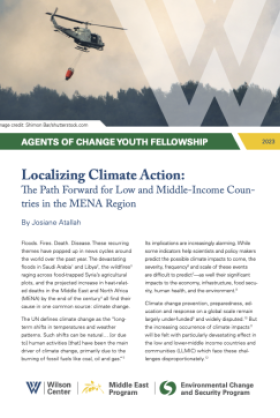Localizing Climate Action: The Best Path Forward for Low and Middle- Income Countries in the MENA Region





Recent destructive floods, earthquakes, forest fires and disease outbreaks demonstrate that disasters have become increasingly complex phenomena. Effective response, reconstruction, and recovery require resource mobilization and sustained collaboration from stakeholders. Low- and Middle-Income (LMI) countries in MENA in particular often lack the financial and technical resources to do so without extensive external support. This leaves crisis- and disaster-affected communities vulnerable to adverse external factors that may delay, limit, or prohibit such support. Given these challenges, the need for localization of climate action in LMI in MENA—i.e. building capacity and allocating resources at the local level—is increasingly clear.


The Wilson Center’s Middle East Program serves as a crucial resource for the policymaking community and beyond, providing analyses and research that helps inform US foreign policymaking, stimulates public debate, and expands knowledge about issues in the wider Middle East and North Africa (MENA) region. Read more


The Environmental Change and Security Program (ECSP) explores the connections between environmental change, health, and population dynamics and their links to conflict, human insecurity, and foreign policy. Read more
